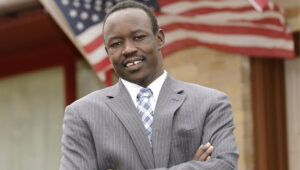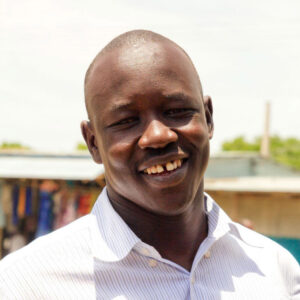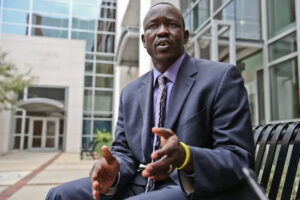Jacob Atem
Credentials
Humanitarian Cause
Healthcare and Food Security, Emergency Response, Provision of Medical Services, Emergency Healthcare, Forced Displacement, Supporting Refugees, Supporting communities in climate-vulnerable regions
Impact Location
South Sudan, Kenya
Occupation
Medical Professional / Co-founder of Southern Sudan Healthcare Organization
Photo Gallery
About
Dr. Jacob Atem is a renowned public health practitioner and refugee advocate, best known for co-founding the Southern Sudan Healthcare Organization (SSHCO). After surviving a harrowing 2,000-mile journey to escape civil war in South Sudan as a child, he has dedicated his life to improving healthcare access for vulnerable populations. Through SSHCO, Dr. Atem has brought medical care and health education to underserved regions of South Sudan, transforming lives in communities long neglected by traditional healthcare systems. His leadership in public health, particularly in the context of refugee and displaced populations, has made him a prominent figure in global humanitarian efforts.
Born in Maar, South Sudan, Jacob Atem’s early years were spent tending to his family’s goats and cows, waking up at dawn each day to search for grass and water. In 1991, when he was just six years old, his village was attacked by rebel forces from Northern Sudan. Gunfire and chaos filled the air, and as Jacob ran back to his village, he saw it engulfed in flames. His family members were either killed or taken into slavery. Faced with the devastating loss of his home and family, Jacob joined a group of other young boys who had also been displaced by the violence. These boys, later known as the Lost Boys of Sudan, began an arduous trek across the African wilderness, hoping to find refuge.
“That war is where I lost my parents. And that war is where over 2.5 million people have died. And that war really, really destroyed everything. It has uprooted the tradition, the culture, and some of us became displaced. I was among the people known as the Lost Boys of Sudan.”
The journey was treacherous. The boys walked nearly 2,000 miles through dangerous terrain, often with little to no food or water. Along the way, they faced threats from wild animals, armed militias, and diseases. One night, while hiding in the bush, Jacob was alerted to a lion’s presence. In the panic that ensued, he ran into a sharp branch that severely injured his leg, cutting it down to the bone. Without access to medical care, Jacob’s wound miraculously did not become infected. However, not all the boys were as fortunate—of the estimated 26,000 to 30,000 children who embarked on this journey, only about 10,000 survived to reach the refugee camps in Kenya. The others succumbed to malnutrition, dehydration, disease, or attacks along the way.
Jacob spent the next nine years in Kakuma Refugee Camp in Kenya, where life remained a daily struggle. The camp was overcrowded, and outbreaks of cholera and other diseases were common, particularly among the younger children.
“When you’re hungry and your stomach lacks food, that alone can kill your dreams. It doesn’t matter how smart you are, even if you’re Einstein—it’s going to affect how you live your daily life.”
In 2001, Jacob’s life took a dramatic turn when he was resettled in the United States, in Lansing, Michigan, where he was placed with a foster family. For the first time, he found himself in a classroom, starting as a high school freshman.
In Michigan, Jacob’s academic interests blossomed, particularly in the field of biology. He decided to pursue a career in medicine, hoping to one day return to South Sudan to provide much-needed healthcare to the people who, like him, had suffered the ravages of war. However, as Jacob advanced in his education, he discovered the field of public health, which he saw as a broader and more impactful way to help vulnerable populations. He earned his Master of Public Health (MPH) from Michigan State University and later completed a Ph.D. in Environmental and Global Health at the University of Florida.
In 2008, while still an undergraduate, Jacob co-founded the Southern Sudan Healthcare Organization (SSHCO) alongside another Lost Boy. SSHCO’s mission is to provide healthcare and health education to the people of South Sudan, particularly in rural areas like Maar, Jacob’s home village. After years of fundraising, SSHCO successfully opened a health clinic in Maar, offering much-needed medical services to a region long neglected by traditional healthcare systems. During the COVID-19 pandemic, SSHCO was the only organization providing vaccines to people in Mangalla, an internally displaced persons (IDP) camp in South Sudan, further cementing its role as a critical lifeline for vulnerable populations.
In addition to his work with SSHCO, Jacob has also served as a postdoctoral fellow at the Center for Humanitarian Health, where his perspective as a former refugee has been invaluable in research and teaching. His work focuses on integrating refugees into national health systems, a challenge that is often exacerbated by their lack of access to health insurance and healthcare services, as well as healthcare providers’ struggles with cultural differences. Jacob believes that public health professionals play a key role in bridging these gaps and improving health outcomes for refugees, both in the U.S. and globally.
“I remember how vulnerable children are. A lot of refugees around me were dying from diarrheal diseases, from preventable diseases. So, I went and did my master’s in public health, and I fell in love with a profession where I could couple my experience of living as a refugee with scientific research.”
Having experienced firsthand the horrors of war, displacement, and disease, he has dedicated his life to ensuring that others do not have to suffer the same fate. His work with SSHCO continues to inspire hope and provide essential healthcare to some of the world’s most vulnerable populations. For Jacob, his journey from being a Lost Boy to a public health leader is not just a personal triumph—it is a call to action for others to join him in the fight for global health equity.



